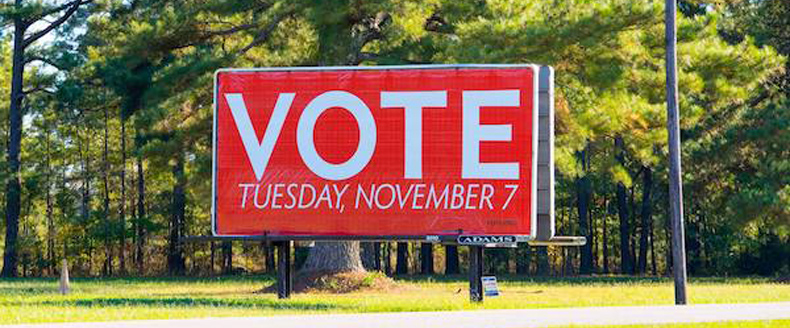Vote.org sent a fundraising email yesterday with an unexpected ask: they want me to give them money to pay for billboards encouraging people to vote. What? Aren’t we all digital and stuff these days?
The actual ask is quite specific. The message starts by noting that two private foundations had bought billboards in minority neighborhoods in recent election cycles warning residents that voter fraud is a crime. These groups have been promoting the idea that voter fraud is a real thing and that black and brown people are the main culprits, and it seems clear that they bought the billboards to suppress votes in these communities.
Figuring that what’s good for the goose is good for the gander, Vote.org ran billboards of their own last year encouraging people to exercise their basic democratic rights. As their fundraiser says,
In 2017, Vote.org went big on billboards and other forms of outdoor advertising in Virginia and Alabama. We placed get-out-the-vote ads on 100 buses and 100 billboards in the Hampton Roads area in Virginia in the four weeks leading up to the gubernatorial race. We went even bigger in Alabama: We bought 140 billboards in Huntsville, Birmingham, Montgomery, Mobile, and other parts of the “Black Belt†and 59 bus ads in Birmingham.
The GOTV ads were simple: they just said VOTE and the day and date of the election. Anecdotally, both reporters and on the ground organizers told us that the billboards were “everywhere”. Mathematically, our billboards and bus ads were viewed over 100 million times by low and mid-propensity voters. And everywhere we placed these billboards voter turnout was higher than had been predicted by experts.
The email follows up by explaining that Vote.org wants to fund more GOTV billboards because they’re cost-effective and seem to work:
Vote.org remains bullish on billboards.
The low inventory and production costs make them one of the cheapest mass-marketing mediums available. We can blanket entire congressional districts for $150,000. We can cover every inch of Florida for $2.2 million.
They’re an excellent way to reach young people — who increasing watch zero minutes of broadcast TV a year.
Corporate marketing studies (including research by Nielson) have demonstrated that consumers notice outdoor advertising, and that young people are especially likely to recall the messages they see on large-format advertising channels.
And these same studies show that billboards are an effective amplifier for other outreach efforts — such as direct mail, radio, and SMS.
Finally, the message strikes an urgent note, asking for money right now because the deadline to buy billboards in time for Election Day is coming up in a few days. The message even includes a link to a slide deck with more details!
As you might have guessed by now, I think this message can teach us plenty:
- It has a specific and urgent ask
- It explains in detail why giving money for this purpose can make a difference
- It uses the opposition as a validator (if they can do it, so can we)
- It shows that a donor’s money will be well spent
- It shows and understanding of Vote.org’s audience and what will motivate them
- The unexpected ask (billboards!) catches the reader’s attention
- It includes an online/offline connection both in its direct ask and when it notes that the billboards will complement digital outreach
This campaign reminds me of an Ultraviolet fundraiser from 2015, which asked for money to fund ads in airports in states that rely heavily on tourism but that also have legislatures dominated by conservative men. Ultraviolet’s message also included a compelling ask, a clear value proposition, an online/offline connection and a goal that its audience would be excited about. In Vote.org’s case, why don’t you reward them with a few dollars in exchange for this fine example? It seems only courteous.
– cpd

